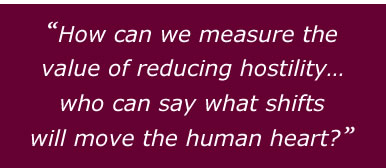Home | Democracy & Our Future | Our Homes & Communities | Cooperation
Effective Activism | Fundraising | National Groups | About & Contact
Making Your Own Efforts Count
When you become engaged in the movement to make democracy work, there are many things you can do where you can see direct results. From registering voters to taking voters to polling places to successful reform campaigns, it is often easy to see the results of your contributions.
With the movement to find common ground, the results can be more qualitative than quantitative, and there will often be no easy way to measure or even observe the results of your efforts. You may, however, be able to feel them.
Many of the most consequential interactions across divides will happen in peoples' living rooms or otherwise in one-to-one or very small group settings. How can we measure the value of reducing hostilities within families? If sister can once again talk with brother about her concerns for the future, and if brother is newly open to trying to hear sister, and if sister returns all that in kind, who can say what shifts will move the human heart?
and if brother is newly open to trying to hear sister, and if sister returns all that in kind, who can say what shifts will move the human heart?
One of the biggest mistakes we could make would be to discount the hard to measure, the intangibles that in the end could make all the difference. Our struggle is not about winning minds. It is about winning hearts. That said, opportunities for participation in the larger and more formally organized movement vary enormously from one community to the next. In some communities, there will be efforts underway that you can join, but not everyone will have good local options.
In some cases, hostility and distrust will clearly block progress toward an end you believe is good and that most of the community also supports. What will work to overcome this obstacle, and what you could contribute to that, involves so much local and personal variation that it is beyond our scope at present to attempt more specific advice concerning how to decide if taking on a peacemaking role works for you.
Nevertheless, below are a few suggestions for things to consider as you decide what you personally want to do.
![]() Assess your advocacy skills and assets, and do what you are best at doing. Are you articulate? Are you a good listener? Are you seen by others as friendly? Are you a good writer? Are you knowledgeable and credible to those around you in particular ways? Are you networked in your community? What parts of the community contain your strongest networks? Do you use social media? Can you anticipate or spot quickly the types of arguments and controversies that are counterproductive? Are you good at avoiding such conflicts? By considering your skills, your strengths and weaknesses, and your ability to keep your emotional balance, you will be more likely pick activities that fit you.
Assess your advocacy skills and assets, and do what you are best at doing. Are you articulate? Are you a good listener? Are you seen by others as friendly? Are you a good writer? Are you knowledgeable and credible to those around you in particular ways? Are you networked in your community? What parts of the community contain your strongest networks? Do you use social media? Can you anticipate or spot quickly the types of arguments and controversies that are counterproductive? Are you good at avoiding such conflicts? By considering your skills, your strengths and weaknesses, and your ability to keep your emotional balance, you will be more likely pick activities that fit you.
![]() Improve your advocacy skills. Most people can improve their effectiveness as an advocate. And many can cultivate within themselves the more positive attitudes and emotions that make building broad community support much easier. The article on Strengthening Your Advocacy Skills contains suggestions to help you cultivate helpful attitudes.
Improve your advocacy skills. Most people can improve their effectiveness as an advocate. And many can cultivate within themselves the more positive attitudes and emotions that make building broad community support much easier. The article on Strengthening Your Advocacy Skills contains suggestions to help you cultivate helpful attitudes.
![]() Consider the distinctive opportunities that go with particular roles you may play (elected official, appointed public administrator, community or transportation planner, business strategist, teacher, lawyer, minister, therapist, journalist, writer, on and on). Each role presents particular opportunities.
Consider the distinctive opportunities that go with particular roles you may play (elected official, appointed public administrator, community or transportation planner, business strategist, teacher, lawyer, minister, therapist, journalist, writer, on and on). Each role presents particular opportunities.
![]() Study your community, your neighborhood, your workplace, and the organizations in which you participate. If you look for them, there may be steps to reduce differences and build greater unity that could win broad support. Notable problems in the recent past may open some opportunities. Look for the overlaps between what activists are interested in working on and what the community may be inclined to support. Pick winnable things.
Study your community, your neighborhood, your workplace, and the organizations in which you participate. If you look for them, there may be steps to reduce differences and build greater unity that could win broad support. Notable problems in the recent past may open some opportunities. Look for the overlaps between what activists are interested in working on and what the community may be inclined to support. Pick winnable things.
Published: July 2019
Revised: June 2023
To Link Or Republish >>
